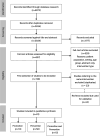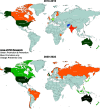A scoping review of digital interventions for the promotion of mental health and prevention of mental health conditions for young people
- PMID: 40230873
- PMCID: PMC11932149
- DOI: 10.1093/oodh/oqaf005
A scoping review of digital interventions for the promotion of mental health and prevention of mental health conditions for young people
Abstract
Digital mental health (DMH) interventions leveraging digital technologies, such as mobile applications, web-based platforms, artificial intelligence and wearable devices, have emerged as a promising avenue for addressing the mental health needs of young people. This scoping review examines the landscape of primary and secondary preventive DMH interventions for young people aged 10-24 years. Six electronic databases were searched, leading to a final incorporation of 81 studies published between 2010 and 2022. Each of these studies corresponds to a unique DMH intervention. Our findings reveal that research activity in the area of promotive and preventive DMH interventions started gaining ground from 2019 onwards, with the majority of studies conducted in Australia and the USA. 70% of the total studies targeted the prevention of mental health conditions. Randomized controlled trials were the predominant study methodology, while mental well-being, depressive disorders, anxiety disorders, life skills and disorders specifically associated with stress were the most targeted mental health or well-being conditions. Finally, mobile applications and web interfaces were the most studied form of DMH interventions. Most of these applications have integrated advanced AI/ML algorithms to serve the purpose of personalization and real-time monitoring. However, there is a marked need for more emphasis on preventive and, especially, promotive mental health measures, as well as the active inclusion of low- and middle-income countries in future research.
Keywords: digital health; digital mental health; digital technologies; mental health; prevention; promotion; young people.
© The Author(s) 2025. Published by Oxford University Press.
Conflict of interest statement
We declare no competing interests.
Figures




Similar articles
-
Digital Mental Health Interventions for Young People Aged 16-25 Years: Scoping Review.J Med Internet Res. 2025 May 9;27:e72892. doi: 10.2196/72892. J Med Internet Res. 2025. PMID: 40344661 Free PMC article.
-
An emerging framework for digital mental health design with Indigenous young people: a scoping review of the involvement of Indigenous young people in the design and evaluation of digital mental health interventions.Syst Rev. 2023 Jul 1;12(1):108. doi: 10.1186/s13643-023-02262-w. Syst Rev. 2023. PMID: 37393283 Free PMC article.
-
Involvement of Indigenous young people in the design and evaluation of digital mental health interventions: a scoping review protocol.Syst Rev. 2021 May 5;10(1):133. doi: 10.1186/s13643-021-01685-7. Syst Rev. 2021. PMID: 33952320 Free PMC article.
-
Evaluation of the Use of Digital Mental Health Platforms and Interventions: Scoping Review.Int J Environ Res Public Health. 2022 Dec 26;20(1):362. doi: 10.3390/ijerph20010362. Int J Environ Res Public Health. 2022. PMID: 36612685 Free PMC article.
-
Understanding Engagement Strategies in Digital Interventions for Mental Health Promotion: Scoping Review.JMIR Ment Health. 2021 Dec 20;8(12):e30000. doi: 10.2196/30000. JMIR Ment Health. 2021. PMID: 34931995 Free PMC article.
References
-
- Han J, Zhang Z, Mascolo Cet al. . Deep learning for mobile mental health: challenges and recent advances. IEEE Signal Process Mag 2021;38:96–105. 10.1109/MSP.2021.3099293 - DOI
-
- Governing Health Futures 2030, The Lancet and Financial Times Commission . Digital Health Futures: Insights into young people’s use and opinions of digital health technologies. Summary report of a 2020 U-Report poll. Geneva, 2021.
Publication types
LinkOut - more resources
Full Text Sources
